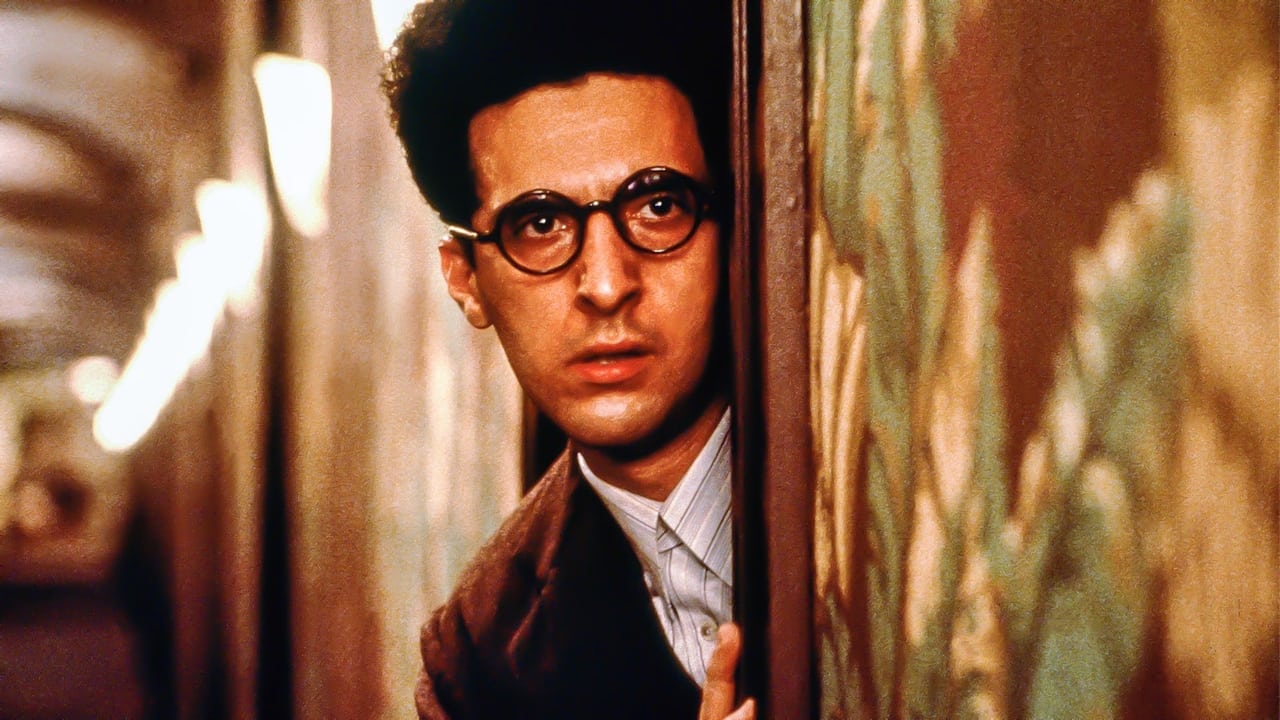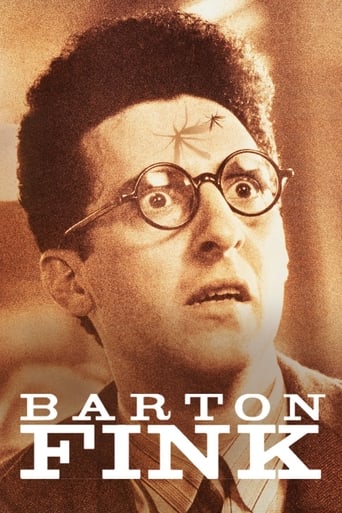Libramedi
Intense, gripping, stylish and poignant
Helloturia
I have absolutely never seen anything like this movie before. You have to see this movie.
Kien Navarro
Exactly the movie you think it is, but not the movie you want it to be.
Phillida
Let me be very fair here, this is not the best movie in my opinion. But, this movie is fun, it has purpose and is very enjoyable to watch.
Samuel-Shovel
I'm going to try to break this movie's symbolism down. This is just my opinion, you're open to your own of course.Personal Interpretations:Barton Fink: Barton Fink represents a member of the intellectuals, claiming to write and make a difference for something that he doesn't truly understand, the common man. While pursuing self- fulfillment through his medium of art, he ignores his muse (Charlie), writing him off as insignificant. Fink thinks of Charlie amiably but does not take his plight or his perspective seriously, ignoring Charlie's own personal struggles and concerns. Fink acts more and more self-righteously towards the common man the longer he stays in Hollywood, evidenced by his behavior at the USO dance. The Hotel: Fink has descended into hell. By leaving New York City and the theater, he has left his ideals behind him, exchanging them for money by selling his soul to the devil (Hollywood). Evidence of the Hell analogy: Chet's arrival to greet him from a subterranean room, the 666 elevator reference, the ever increasing heat in the rooms, and, of course, the consuming conflagration at the end of the movie. Notice also the broken pencil with the dust outline in his hotel room. This symbolizes that Hollywood is not a place to be writing anything significant, nor has it been for a long time.The Peeling Wallpaper: The walls are a metaphor for Fink's mental stability. As the movie progresses and Fink's life falls apart, more and more often the wallpaper can be seen peeling away. Charlie has ruined Fink's life since the pair's first meeting. Distracting Fink from his work, murdering his lover, killing his "friend" (and possibly family), and getting Fink in trouble with the cops. The wallpaper crumbles like Fink's psyche. The Mosquito: I see this as Hollywood and the work that Fink has been tasked to do sucking him dry of willpower and artistic integrity. The bloodsucking causes him to look ugly to the audience. The film's score (specifically the strings) also sounds very similar to the buzzing of a mosquito. The turning point of the movie is when he kills the mosquito on Audrey's back. It isn't until after Fink kills the mosquito that he is able to write anything he deems meaningful. Whether his script is good or realistically represents the common man is unknown to us but Fink once again has purpose as he writes something for himself, not Hollywood. My guess is his script still doesn't represent the common man since after he completes it, he goes to the dance and still talks down to the military men. This script is more about fulfilling Fink's artistic needs.Charlie: Charlie can be interpreted as having multiple meanings within this film. He seems to be some type of fallen angel, a sinner stuck in hell selling "fire insurance". He tries to help people but all his good intentions are ill-advised as all he causes is trouble wherever he goes. He sees that Fink does not listen to the common man or his plight. He watches as Fink pursues wealth over ideals. He hears as Fink literally gets in bed with Hollywood. Charlie kills Audrey. Fink has abandoned Charlie in favor of a new muse (Audrey) by asking her for help with the common man's story instead of listening to Charlie the common man. He had abandoned who he has sworn to write about. Charlie kills Audrey and Mayhew as both a punishment and a lesson for Fink about what selling your soul to the devil will get you. They represent Hollywood over the common man. All Charlie wants is for someone to represent him, the common man. Charlie also represents the rise of fascism at that period of time. You could argue that he represents Hitler's regime. It was something that many people considered harmless at first (Fink's initial impression) that slowly got grimmer and grimmer with time. Many intellectuals of the time just couldn't understand why fascism could be so appealing to the common man. Notice once again how Fink writes Charlie and the common man off, not listening to his ideas or stories. Fascism had a certain allure to the common man that the intellectuals ignored and refused to understand, costing people dearly. The Detectives: It's important to note that the detectives' names are Mastrionotti & Deutsch, stereotypical Italian and German names, respectively. These two, who Fink refers to also as "common men", further the allegory of common men under Fascist regimes. The two read Fink's script, not understanding it or particularly caring for it. The two also frown upon Fink's Jewish heritage at one point. This metaphor gets a little hazy since Charlie kills them both. I'm not exactly sure of its significance. The Picture and the Box: Throughout the movie, Fink's eyes are drawn to a picture on his hotel wall. It shows an ocean and a girl, the blue water juxtaposing his current position in hell. This represents his artistic ideals, just a snapshot but not readily attainable to him. Notice as he often looks at it familiarly, as if he's seen it somewhere. At one point, he hangs Charlie's picture in the corner of the frame in an attempt to possibly gain better understanding of the common man. At the end of the movie when the picture is recreated in front of him, Fink is experiencing enlightenment. Has Fink finally regained his moralistic ideals after denying Hollywood the script they wanted? Charlie has given him the box which belongs neither to Charlie nor Fink. It is the box representing the plight of the common man. When the lady asks if it's his, Fink replies that he doesn't know. Fink must decide whether he wants to actually take up the plight of the common man or continue to write shallow artistic pieces about the common man that only please the upper class.
Urek Arokov
Barton Fink is movie that proves yet again all you need to do is throw nonsense in a blender, do it with style and pretend it means something, and people will eat it up. I'm no stranger to symbolic and surreal movies (Eraserhead is one of my very favorites), but this is something (like Barton himself in the film) that bears no substance and is purely superficial. What makes it so much worse, and most ironic, is that the movie attempts to disprove that in its message but ultimately ends up being just as much a part of it (if not moreso due to its aforementioned intention and execution).It's not surprising given its reputation among so-called """cinephiles""" but it's all the more frustrating because I fell for it. I admit, I was thoroughly engrossed by the film, largely due to its beautiful set design and unconventional narrative structure. Not to mention, it has some good bits of black humor as well, but beyond that there's nothing there. And in the end, it left me feeling dumb for having played along.
Charlie Doble
I don't think anyone makes movies as different as Joel and Ethan Coen. Every single one of their films is so dramatically different from the last that you never know what to expect going in. That was how I felt when I saw Barton Fink for the first time. Out of their entire filmography I had only seen The Big Lebowski, and I thought it was a good, but not great. The story didn't go anywhere and a lot of the plots that the movie sets up never really finish, but I think that was what they were trying to go for. With Barton Fink, I can't think of a single problem with it. Everything is great, the direction, the writing, especially the acting, with John Goodman once again being the highlight. Another great thing about the film is its cinematography from Roger Deakins, who worked on most of the Coen Bros movies. The story is as follows: Barton Fink (played brilliantly by John Tuturro) is a playwright who is offered a chance to write a film for Capital Pictures. Once he gets there, he suffers from Writer's Block and seeks help from his friend, Charlie, among others. That's all I'm going to say about the plot, because I don't want to ruin it for you. The film has an almost dream-like setting, and a lot of the visuals are fascinatingly strange and intriguing. Barton Fink is one of the greatest movies about movie-making I've ever seen (topped only by Ed Wood) and I strongly recommend you watch it, especially if you're a film student.
D' Francis
In seeking to follow the hottest trends, a major film studio hires a pretentious and prestigious writer named Barton Fink to write a B-list movie. You can only imagine how this turns out.What exactly this movie is trying to accomplish will go over the heads of the average movie viewer, which is why this gem flopped. First and foremost, it's a farcical comedy. While containing convincing elements of drama and horror, it all only serves to create the big irony of just about everything going wrong as poor Barton tries to write his masterpiece.The film is rife with iconography and symbolism. The viewer can choose to interpret what goes on literally or figuratively. This movie is a masterpiece both celebrating the beauty of writing and ridiculing it. It's commentary on the mainstream film industry which lasts until today. It sure conveys a whole lot for a movie that doesn't to be remembered for meaning anything.

